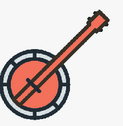Why should I learn Scales?
Scales are the foundation to building the chords. Each scale, whether it be major, minor, dominant, Lydian Dominant, Harmonic minor, pentatonic and on, enables you to construct different set of chords, because of its structure, i.e., the intervals between notes of the scales. Scales are important for a guitarist, just as learning good grammar is important to speaking properly. If you are intent on playing an instrument then learning the language of music is going to be inevitable. In this case scales are then the backbone of chord building and harmony. And, reversed, when you see the chord and you know from which scale it has been constructed, you can use this scale to improvise or compose a melody over that chord. So if you see a G7 chord, it's a C major scale chord, or G mixolydian if we were talking about modes. So you can more or less play notes of the C major scale and they will sound good over this chord, but not all of them equally good. So, you can use scales with melody and improvisation. Considering both statements above, scale knowledge facilitates composition a lot. It tells you which note will be diatonic, i.e., a scale notes, and which one will not be, which can be used to build tension for example. Scales can be thought as one of the systems to organize and get to know well your fretboard. Many rock, blues, metal players rely on this system solely. If you are curious, there is the "CAGED" system, based around chord shapes popular amongst jazz players, but there other systems as well. At the end, learning the scales will help you to improvise solos, create new melodies and start playing second instruments in the background of a song making beautiful and harmonic sounds.




